[Publications are mostly in french. Only some presentations are translated here]
BOOKS
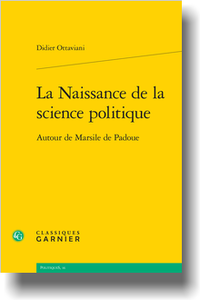 La naissance de la science politique. Autour de Marsile de Padoue, Paris, Classiques Garnier, 2018, 397p.
La naissance de la science politique. Autour de Marsile de Padoue, Paris, Classiques Garnier, 2018, 397p.
[The Birth of Political Science. Around Marsilius of Padua] Classified within morality and considered at the end of the Middle Ages as a simple practice, an art of governing, politics could not properly claim the title of science, reserved for purely theoretical knowledge. At the turn between the 13th and 14th centuries, some thinkers nevertheless sought to give a new meaning to civil science by using, like Dante, demonstrative reasoning in their treatises. However, it was only with the Defensor Pacis of Marsilio de Padua (1324) that this discipline, both theoretical and practical, managed to extricate itself from the realm of art. By producing a real discourse on the method inspired by medicine, Marsilius thus makes possible the birth of political science.
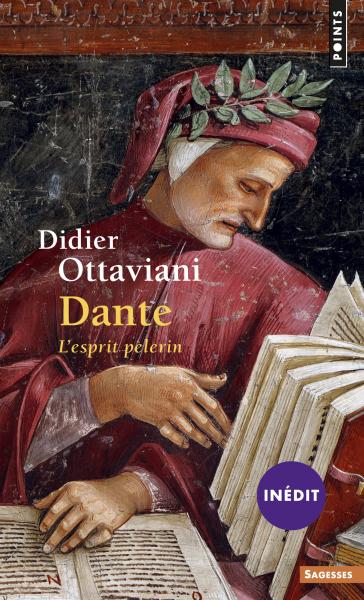 Dante. L’esprit pèlerin, Paris, Points-Sagesses, Seuil, 2016, 176p.
Dante. L’esprit pèlerin, Paris, Points-Sagesses, Seuil, 2016, 176p.
[Dante. The Pilgrim Spirit] Dante’s fame is explained by the universal dimension of his personal experience, his hopes or his doubts, delivering a timeless questioning of the very status of the human subject. In this metaphysical journey witch is the Divine Comedy, the poet describes the metamorphosis of the individual from the sensitive to the spiritual, the birth of an authentic subject, capable both of accepting his mortal condition and of accessing what Dante names, in Paradise, the trasumanar. This neologism by which he translates an experience of going beyond the self and the human is undoubtedly the key to reading from which his work takes on meaning: amorous disappointments, condemnations or exile, it manifests the long road traveled by this « spirit ». pilgrim ”, from the human to the superhuman. A metamorphosis of the self that is also a metamorphosis of love in all its forms.
 L’humanisme de Michel Foucault, Paris, Le sens figuré, 2008, 157p. (trad. coréenne, 미셸 푸코의 휴머니즘, Séoul, The Open Books Co., 2010).
L’humanisme de Michel Foucault, Paris, Le sens figuré, 2008, 157p. (trad. coréenne, 미셸 푸코의 휴머니즘, Séoul, The Open Books Co., 2010).
[Michel Foucault’s Humanism] Michel Foucault, humanist? This is the a priori paradoxical thesis of this illustrated introduction to the thinker of … the « death of man » – a death that is moreover less tragic than we have wanted to say. A humanist, Michel Foucault is by developing, through his « archeology of knowledge » and his clinical descriptions of social mechanisms, a renewed vision of man caught in his difference, in his variety rather than in his alleged unity. Didactically and through drawing, the book follows the path of this thought, from an apparent anti-humanism to an authentic humanism of « care for the self ». A thought of resistance, of freedom to be reclaimed within a web of truths, social norms and practices of control.
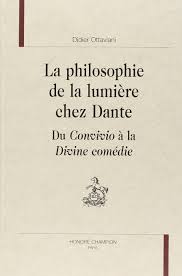
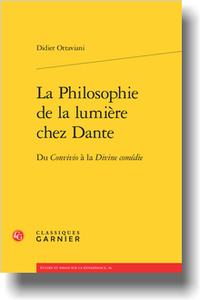 La philosophie de la lumière chez Dante. Du Convivio à la Divine comédie, Paris, Classiques Garnier, 2016, 477p. (1èreédition : Paris, Honoré Champion, 2004).
La philosophie de la lumière chez Dante. Du Convivio à la Divine comédie, Paris, Classiques Garnier, 2016, 477p. (1èreédition : Paris, Honoré Champion, 2004).
[Dante’s Light Philosophy. From Convivio to the Divine Comedy] Dante’s thought sits at the confluence of different philosophical traditions from antiquity and the Middle Ages, and finds its completion, not in his strictly « philosophical » treatises, but in the verses of Paradise. If the poetic form does not make it possible to fully restore the demonstrations of rational thought, these are not for all that absent from the Divine Comedy, as this reading attempts to show. By underlining the modifications that the concepts undergo between the Convivio and the Sacred Poem, it is possible to reconstitute a philosophy which is firmly placed in the Aristotelian wake of a natural philosophy, integrating at the same time the Greek, Arab and Latin traditions. The study of the notion of « light », in its double physical and metaphysical meaning, makes it possible to grasp the richness and the originality of this thought, because it makes it possible to articulate the various aspects of the work in a harmonious whole and coherent, which is at the confluence of Aristotelianism and Neoplatonism. Heir to medieval thought, Dante offers a new philosophy that closes an era and opens onto the Renaissance. At the end of the book there is a translation of Robert Grosseteste’s « De luce seu de inchoatione formarum ».
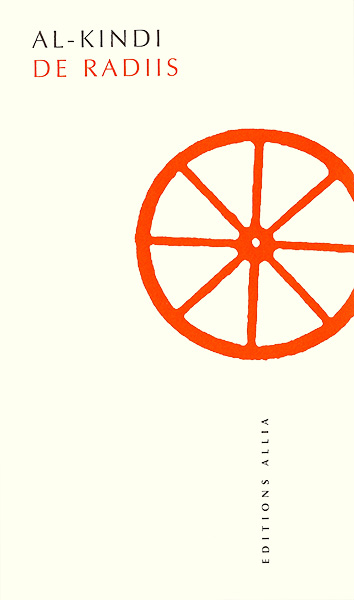 Alkindi, De radiis (French translation and presentation), Paris, Allia, 2003, 112p.
Alkindi, De radiis (French translation and presentation), Paris, Allia, 2003, 112p.
« The one who is said to be the wisest, and who is, is the one who perceives, in things and their properties, what is least noticeable. Hence the fact that those who are formed by the holy desire for wisdom work hard to understand the hidden qualities of things. «
We only know Alkindi’s « De radiis » from its Latin translation. The author of this translation captioned the book « Theory of the Magical Arts », so much the thought expressed there can appear to be esoteric. In fact Al-Kindi wants to be entirely rational and seeks to make us understand how, by his knowledge and in a progressive way, man is able to bring about changes in things. At the center of the book is therefore the theory of rays, based on the postulate of « universal harmony », which assumes relations between all things, whether celestial or terrestrial. Al-Kindi’s treaty had an extraordinary repercussion in the Middle Ages and the Renaissance and nourished the whole school with the so-called “magical” thought that Marsile Ficino, Pic de la Mirandole and Giordano Bruno studied.
 Premières leçons sur les trois Lettres d’Épicure , Paris, Major-Bac, PUF, 1998, 128p.
Premières leçons sur les trois Lettres d’Épicure , Paris, Major-Bac, PUF, 1998, 128p.
[Firts Lessons on Epicurus Three Letters] Mortal and fragile, subject to a nature he often does not understand, man lives in perpetual fear, in fear of the gods, pain and death. Epicurus outlines a new path by caring about the human individual and develops a true theory of happiness. Often slandered and rejected, Epicureanism crosses the history of thought as a constant challenge that still questions us today. The pupil is invited to discover a thought that is not so much a philosophical system as a method of living happily. By following the consistency of this physical and moral doctrine developed in three Letters, they will be able to initiate themselves into a practice of philosophy, where knowledge becomes a remedy.
CO-EDITED BOOKS
Art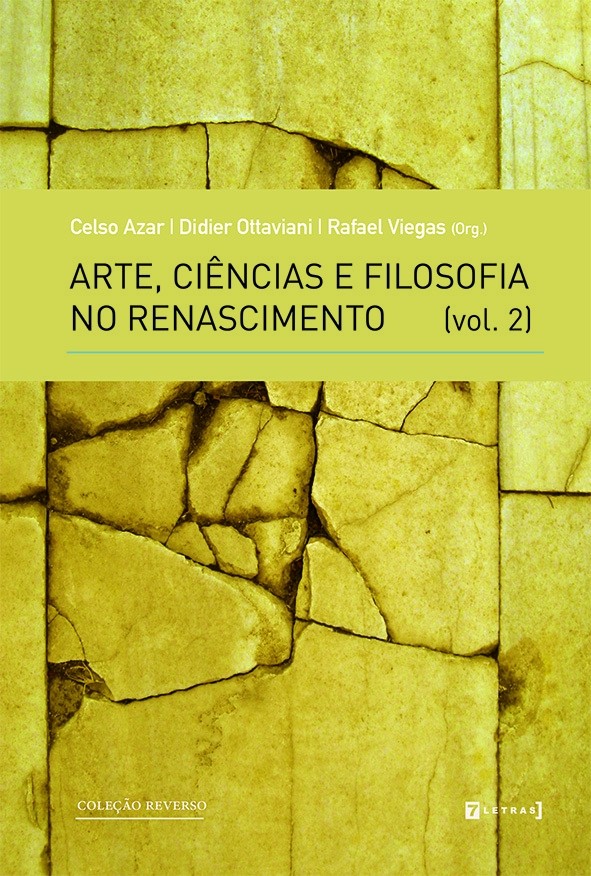 e, ciências e filosofia no Renascimento. Vol. II [in Portuguese], C. Martins Azar Filho, D. Ottaviani et R. Viegas (Dirs.), Rio de Janeiro, 7 Letras, 2019.
e, ciências e filosofia no Renascimento. Vol. II [in Portuguese], C. Martins Azar Filho, D. Ottaviani et R. Viegas (Dirs.), Rio de Janeiro, 7 Letras, 2019.
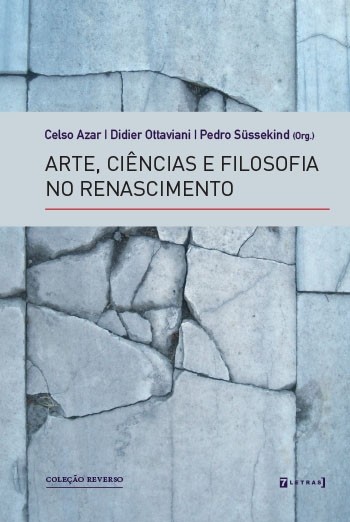 Arte, ciências e filosofia no Renascimento. Vol. I [in Portuguese], C. Martins Azar Filho, D. Ottaviani et P. Süssekind (Dirs.), Rio de Janeiro, 7 Letras, 2018.
Arte, ciências e filosofia no Renascimento. Vol. I [in Portuguese], C. Martins Azar Filho, D. Ottaviani et P. Süssekind (Dirs.), Rio de Janeiro, 7 Letras, 2018.
NOTICES
• Notices « Boèce », « Dante », « Thomas d’Aquin », « Éternité », « Félicité », dans Le bonheur. Dictionnaire historique et critique, M. Gally (éd.), Paris, CNRS Éditions, 2019.
• Notice : « Platonisme et néoplatonisme », dans C. Charle, D. Roche et alii (éd.), L’Europe, encyclopédie historique, Paris, Actes Sud, 2018.
• Membre de l’équipe interne de rédaction et rédacteur de notices pour le Grand dictionnaire de la philosophie, M. Blay (dir .), Larousse, Paris, 2003 (rédaction des notices : Averroïsme, Avicennisme, Mémoire, Mercantilisme, Métaphysique, Microcosme-macrocosme, Milieu, Misologie, Monde, Moralité, Multiple, Mystique, Mythe, Naturalisme, Nature, Négation, Noblesse, Non-être, Noumène, Objectif, Objet, Ontique, Ontologie, Ordre, Organon, Outil, Paix, Personnalisme, Personne, Phénomène, Philosophie).
ARTICLES
• « Dante, de la commune à l’Empire », dans Revue des études dantesques, Paris, Classiques Garnier (à paraître).
• « Montaigne, une relation ambiguë à la médecine de son temps », dans Les origines de l’anthropologie moderne en Europe (XVIe-XVIIIe siècles) : philosophie et médecine, M. Mestre (dir.), Madrid, Publication de la Casa de Velàsquez (à paraître).
• « Les paradigmes néoplatoniciens chez Marsile de Padoue », dans La pensée en devenir. La réception du platonisme et du néoplatonisme dans l’histoire de la philosophie, M. Lequan (dir.), Peeters, Louvain (à paraître).
• « À l’aube de la Renaissance : image, histoire et construction de soi chez Dante » (en portugais), dans C. Azar et P. Lavelle (dirs.), Imagem e História, Editora da UFF, Nitéroi (à paraître).
• « Produire la vérité : aveu et confession », dans Philosophiques (à paraître).
• « Personnages en quête d’auteur », dans Tetrade, n°6, Université de Picardie Jules Verne, 2020.
• « La fantaisie comme fonction cognitive chez Montaigne », dans Libertinage et philosophie à l’époque classique (XVIe-XVIIIe siècles), N. Gengoux, P. Girard, M. Laerke (dirs.), Classiques Garnier, 2019.
• « Montaigne, Médico da Alma » (en portuguais), dans Arte, ciências e filosofia no Renascimento, C. Martins Azar Filho, D. Ottaviani et P. Süssekind (orgs.), Rio de Janeiro, 7 Letras, 2018.
• « Connaissance et digestion : Montaigne et l’alimentation », dans Les mériers de bouche à l’époque moderne, N. Peyrebonne (dir.), Presses Universitaires de Rennes, 2018.
• « Du peuple souverain : Marsile de Padoue et Rousseau », dans Rousseau, la République, la Paix, C. Miqueu et G. Galice (dir.), Honoré Champion, 2017.
• (avec A. Milanese), « Le rôle de l’imagination dans la construction du sujet chez Montaigne et Hobbes », dans L’axe Montaigne-Hobbes : anthropologie et politique, E. Ferrari et T. Gontier (dir.), Classiques Garnier, Paris, 2016, p. 47-74.
• « Foi et raison : remarques autour d’un paradigme métaphysique », dans P. Girard (dir.) Les métaphysiques des Lumières, Classiques Garnier, Paris, 2016, p. 17-34.
• « Giordano Bruno et l’athéisme », dans Athéisme voilé aux temps modernes, A. Stacquet (dir.), Académie Royale de Belgique, Bruxelles, 2013, p. 101-118.
• « Élasticité et temporalité des images », dans L’engendrement des images en bande dessinée, H. Garric (dir.), Presses Universitaires François Rabelais, Tours, 2013, p. 127-142.
• « A pôtencia da linguagem em Dante », dans Neoplatonismo. Mistica e linguagem, M. R. Pinheiro et
C. M. Azar Filho (dir.), Editora da UFF, Niteroi, 2013, p. 141-163.
• « Dante, poeta do Absoluto e das metáforas divinas », entrevue pour la revue en ligne brésilienne Revìsta do Instituto Humanitas Unisinos (IHU on-line), n° 419, 20 mai 2013.
• « Cartésianisme, formes substantielles et création continuée », dans Qu’est-ce qu’être cartésien ?, D. Kolesnik-Antoine (dir.), ENS-Éditions, Lyon, 2013, p. 69-78.
• « Habitude, coutume et accoutumance », dans Les figures de la coutume. Autour du Discours de la servitude volontaire, L. Gerbier et O. Guerrier (dir.), Classiques Garnier, 2012, p. 135-147.
• « ¿ Qué es el Agustinismo ? » dans Agustín en España (siglos XVI y XVII) : Aspectos de Filosofía, Teología y Espiritualidad, Revue Criticón, n°111-112, Presse Universitaires du Mirail, Toulouse, 2011, p. 11-24.
• « La Renaissance : de la magie à la science », dans Au temps des grandes découvertes : quand l’Europe renaît, A. Staquet (dir.), Éditions de l’Université de Mons, 2010, p. 21-35.
• « Le Pape et l’Empereur », dans Erytheis, n°3, sept. 2008
• Commentaire linéaire du Convivio de Dante (Livres I et II), Cours du CNED pour l’agrégation externe de philosophie, 2008.
• « Montaigne, méthode et interprétation », dans Réforme, Humanisme, Renaissance, n° 64, juindécembre 2007, p. 59-72.
• « Un monde en gestation (sur saint Augustin) », dans Magazine littéraire, n°439, février 2005.
• « La Méthode scientifique de Pietro d’Abano dans le Conciliator », dans Méthodes et statut des sciences au Moyen Âge et à la Renaissance, C. Grellard (dir.), Presses Universitaires du Septentrion, Lille, 2004.
• « La prophétie comme achèvement intellectuel à la fin du moyen âge », Nouvelle Revue du Seizième siècle, n° 21/1, Droz, Paris-Genève, 2003.
• « Foucault-Deleuze : de la discipline au contrôle », dans Lectures de Michel Foucault II, ENS-Editions, Lyon, 2003.
• « Le paradigme de l’embryon à la fin du Moyen Âge », dans Astérion, n°1, 1er juin 2003.
• « Le Philosophe et le politique : de Dante à Marsile de Padoue », dans Le Philosophe, le sage et le politique. De Machiavel aux lumières, Presses de l’Université de Saint-Étienne, 2002.
• « La Notion de materia prima chez Dante », dans Qu’est-ce que la matière ? ; F. Monnoyeur (dir.), « Biblio essais », Le Livre de Poche, Paris, 2000.
• « Le Peuple en puissance : Marsile de Padoue », dans De la puissance du peuple. I. La démocratie de Platon à Rawls, Y. Vargas (dir.), publication du GEMR, Paris, 2000.
• «L’Intellectuel laïque : de Siger de Brabant à Pietro d’Abano », dans Les Athéismes philosophiques, Kimé, Paris, 2000.
• « De l’Unité de l’âme à la métamorphose dans la philosophie de Dante », dans Les Âmes, C. Duflo (dir.), Presses Universitaires Franc-Comtoises, Besançon, 1999.
• « Le Statut du monstre dans l’art roman », dans La Sculpture romane au regard de la philosophie, Autrement Dit, Poitiers, 1996.
• « Le statut de la machine dans les Carnets de Léonard de Vinci », Otrante, n°5, Kimé, Paris, 1993, p. 7-15.
